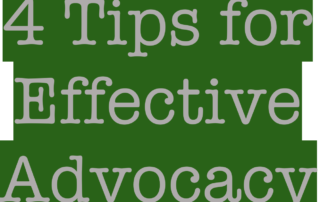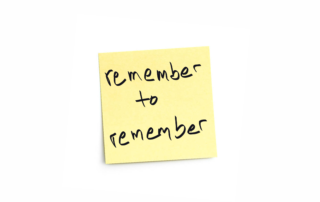**Following my recent webinar focused (ironically) on understanding ADHD, an attendee sent me a message asking for some guidance on how to be an effective advocate. After I responded, I thought maybe I would share it with everyone. This isn’t an exhaustive list, they’re just the first things that came to mind. Do Not Hide The most important place to start is to be out in the open. Talk about your ADHD in a matter-of-fact way. Share your story. You don’t have to work it into your conversation because it is your actual life. The best way to advocate is to educate. What you are educating people about is what ADHD looks like in everyday situations. Once we’ve sown the seeds of awareness, sometimes attraction is more effective than promotion. If all we ever do is advocate and educate then people won’t want to hear from us anymore. There’s an ebb and flow in this process. Everything is a teaching opportunity but not everything is a teaching moment. Find your People Join organizations that promote awareness like CADDRA, CADDAC, CHADD, etc. Follow FB pages or IG accounts that are devoted to building a sense of community within the ADHD world, not just lamenting the current conditions. […]
ILYSM: Beware of Counterfeit Sentiment
The Danger of “Loving” Everyone So Much Here is a typical social media scenario. Person A posts selfie after 38 attempts to get the pose just right enough to look spontaneous and natural. Caption to selfie has no connection with selfie at all, just some brief commentary on what’s going on that day or moment. Person B sees selfie, doesn’t read caption, digitally likes the selfie (not the same as really liking it), and comments, “ILYSM”. For the uninitiated, those letters are short for “I love you so much”. This starts a cascade of ILYSMs that might number in the dozens or more. As you scroll through the comments, virtually no one has mentioned the caption. If satisfied with the response, Person A repeats the pattern later that day. If unsatisfied, Person A deletes the post, tries a different pose with unrelated caption, or a sympathy-seeking caption, and tries again. So why is ILYSM so dangerous? Because it is fool’s gold. The danger of mindlessly churning out over-the-top expressions of affection is not only that there is little substance to them, but that even more insidiously, it dulls a person’s ability to recognize genuine affection and fidelity. As Violet, from […]
Join the Club! An Alternative ADHD Screening Tool
The more I work with clients with ADHD and explore the common threads that link us together, the less satisfied I am with the screening tools that are used. It’s not that the tools are inaccurate, it’s that they are incomplete, in my opinion. It is hard to boil the lived experience of ADHD down to 18 questions on a form, I’ll give you that, and you probably don’t want to make the form too long or complicated or the client will get distracted, forget that they are doing it, get bored and put it down and lose it, etc. Having said that, I find that one of the advantages of being a clinician who actually lives with an ADHD brain is that I can sometimes go beyond the surface-level questionnaires and dig a bit deeper into the more subtle aspects of being this way. For this reason, I have come up with my own questionnaire. It is not scored, there is no rating scale and there is no cutoff, categorical designation that tells you whether you “have it” or not. Instead, read through it, or have someone read it to you and think on each item: Can I relate […]
Perspective: The Gatekeeper
Often we are hard on ourselves when we don’t need to be, particularly when it comes to how much things that have happened to us continue to affect us. We like to think that we can just let things go, move on, and get over it but that’s just not how things actually work. Our past experiences continue to affect our current perception of events unless we actively try to overcome this natural tendency. Similarly, it is very difficult for a tall building to stand straight when the foundation is crooked. The only way to straighten the building is to work on the foundation, not the 30th floor. Often, when discussing current struggles with my clients, they will remark that they feel a lot of anxiety or depressed feelings “for absolutely no reason”. This is rarely the case. It is more accurate to say that they are feeling anxiety for no known reason, or no current reason. There’s always a reason. One way that is helpful for people to unlock the true impact of the past on their present is to get them to see it from outside of themselves. No, this does not involve high doses of hallucinogenic mushrooms, […]
Fighting Back Against Negativity
Our brains are wired to look for the negative. Why is this? Stated simply, it’s about survival. Think about it: if you lived in the jungle and on your way home at the end of the day, if you didn’t stop to notice the pretty flowers, would it endanger you? No. But, if you didn’t notice the poisonous snake or the scary tiger or the cave-to-cave salesman, then you might actually be in danger. Thus, it is advantageous to our survival to keep an eye out for negative, unsafe, dangerous things. However, we don’t live in the jungle anymore and the threats to our survival aren’t quite as literal anymore. We haven’t yet gotten rid of this natural instinct however; it has just transferred to other threats, social threats. We look for signs of rejection, exclusion, not belonging, not measuring up, etc. We do so because belonging to the group equals safety. Or at least it used to; that’s another fossil from our pre-industrialized past. With the development of cities and technology, a man can actually be an island and survive. I’m not saying he will be the happiest man, but he will be alive. So, how do we overcome […]
Things I Was Wrong About, Vol. 3: I Don’t Need Any Help
Independence runs fiercely deep in my family. The ability to shrug off pain and keep going is a virtue valued by many, including those whom I love. I remember one time (of several such instances) when my dad and I were working together clearing some brush, using a wood-chipper. Let me assure you, this story doesn’t end as badly as you might think it does, as the wood-chipper plays a secondary role. Anyway, as my dad was feeding a tree branch into the chipper, the teeth grabbed it and sucked it in quicker than he was anticipating. Some of the auxiliary branches of the main branch were rapidly pulled forward, slicing across his face. He grunted and put his hand over his eye. I looked to see blood seeping between the fingers of his gloved hand. I had no idea what the severity of his injury was and I stopped to ask if he was ok. He responded by vigorously rubbing the blood out of his eye, revealing a gash across his eyelid. The gash quickly filled with blood again, which he wiped again. Then, instead of cleaning the wound and getting some medical attention, he just picked up the […]
I Want a Ladder for my Birthday (A Short Story)
Tim was four years old. His mom was a lot older than that. So was his dad. His brother Jeff was older too. Tim’s birthday was coming up soon. He knew exactly what he wanted. “I want a ladder for my birthday,” Tim told his mom. She didn’t hear because she was busy with “an important phone call”. Tim wondered why the phone call was so important. “I want a ladder for my birthday,” Tim told his dad. He didn’t hear because he was heading out the door to meet with “clients”. Tim wondered who “clients” was. “’Clients’ must be important too,” thought Tim. “I want a ladder for my birthday,” Tim told his brother Jeff. Jeff didn’t hear him because he was too busy ignoring everyone who wasn’t on TV. “I wish I was on TV,” thought Tim. At dinner, Tim told his parents, “I want a ladder for my birthday.” “That’s nice,” said his mom, who was reading a magazine about important people. “Hmmm,” said his dad, who was looking at something important on his computer. Jeff said nothing because Tim wasn’t on TV. Tim drew a picture of a ladder and colored it. He got some tape […]













Recent Comments